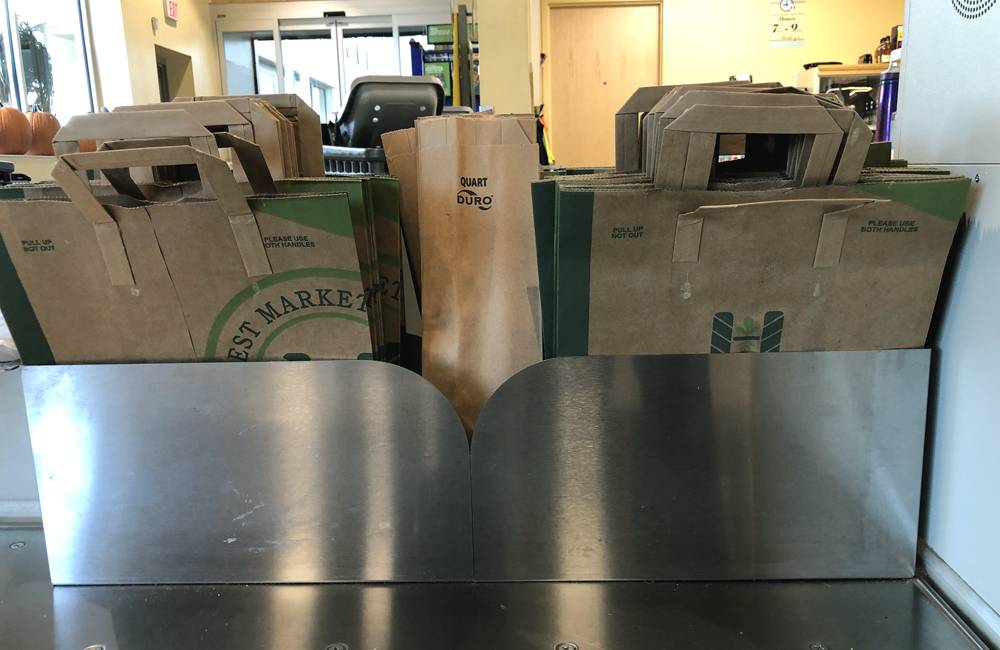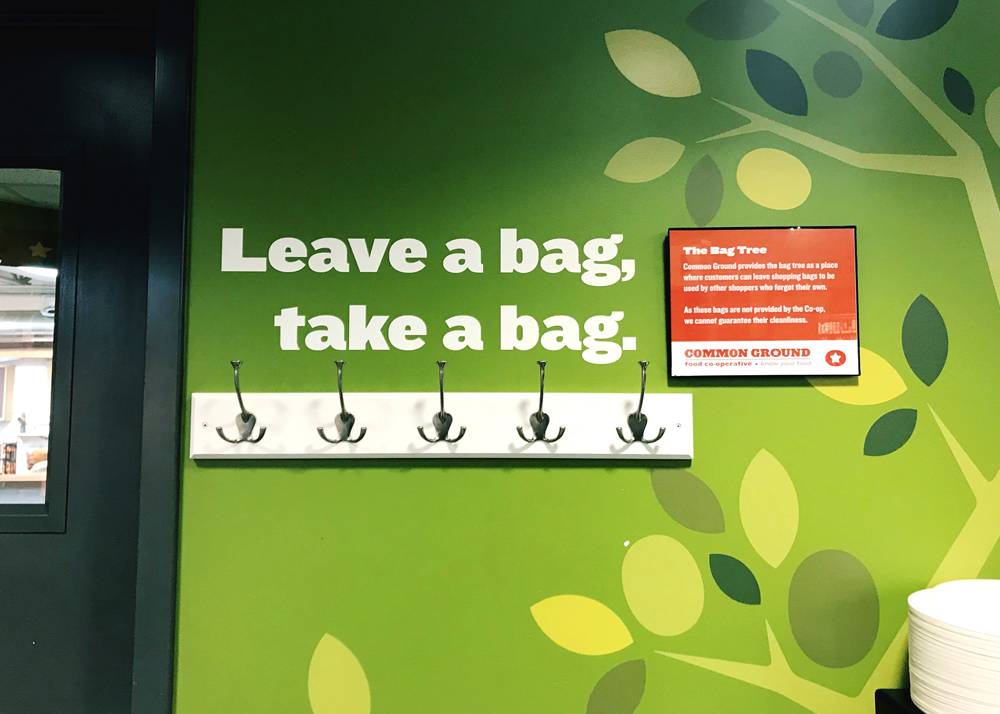Late last year, we noticed that Harvest Market no longer offered single use plastic grocery bags at checkout. Just this month, Common Ground Food Co-op (which does not offer plastic bags at checkout) began charging $0.20 for paper bags. Both gestures encourage customers to bring their own reusable bags.
These two changes had us thinking: Should C-U ban single use plastic bags? Is this something we can do, as a community, to help create a little less garbage and mitigate the impact we’re having on the environment? We think the answer is yes.
It’s important to note that the onus of fixing things that were broken by big companies, big governments, and big systems should not fall on the individual. One person’s switch from plastic straws to metal straws, or plastic bags to canvas bags will not undo decades of environmental damage. But as some argue, it’s the collective action by many individuals that can potentially help mitigate future damages, and possibly inspire others to make changes. It’s clear that waiting for state and federal responses to the global climate crisis is not an option; it feels like we’re already out of time.
On a practical and local level, we think a plastic bag ban has to start with efforts by consumers. We — the people, the consumers — must aggravate and advocate for change. Those of us with the privilege to do so must contact our elected representatives, our favorite retailers, the restaurants we visit.
Some state representatives are already on board with these changes, encouraging Illinois join plenty of other states banning plastic bags. Last year Illinois State Senator Terry Link (D – Gurnee) introduced SB 1240, a bill that imposes a $0.07 tax on single use plastic bags at retail locations in cities smaller than 2.5 million people (which is essentially all of Illinois except Chicago, which has its own plastic bag tax). On the surface, this seems like an effective way to incentivize customers to bring their own bags, and fill in some budget gaps. In a state with so many financial problems, this sort of regressive tax seems like a solution to puff up the coffers, but evidence from other states indicates that it might not actually bring in that much money.
And a plastic bag tax is just that: a regressive tax that disproportionately penalizes those without the means to acquire reusable bags, even if reusable bags are only a couple of dollars. Is there a better way to enact this sort of legislation? Does it need to be a tax, or can it be a phase-out to a ban without taxing the public? Is there a way to tax the businesses that dish out all of these bags? What if the cities of Champaign and Urbana decided that any new business couldn’t use plastic bags, and put existing businesses on a timetable for phasing out plastic bags? What about some sort of tax incentive to encourage these businesses to do so? We know it’s incredibly difficult and expensive to open a business — and we want to encourage people to do so here — but there needs to be some sort of solution.

Image: The self checkout bagging area at Harvest Market. A stainless steel bagging area and stainless steel container holds paper grocery bags labeled with “Harvest Market” logos and text. Photo by Jessica Hammie.
For retailers and restaurants, phasing out or taxing plastic bags means a financial investment for paper or reusable bags. That sort of cost will be passed on to the consumer in the form of higher prices. But what about splitting the difference, and offering a small discount to consumers who bring their own bags? Target does this already; customers with their own bags receive a $0.05 discount. Sure, it’s an infinitesimally small amount, but it’s there nonetheless. In theory, in the long run, customers will use fewer paper bags, because they’ll be rewarded for using their own. The financial investment is not ongoing. Additionally, retailers can create a leave one/take one space for reusable and paper bags, like Common Ground Food Co-op has.
It’s clear that banning plastic bags is not the single answer for limiting plastic consumption, but it’s a start. And, of course, there will likely be other unintended consequences: In Connecticut, for example, a plastic bag tax took effect last summer and grocers are losing plastic shopping baskets to customers taking them instead of buying reusable bags. That’s less than ideal, but why not do what Costco, Sam’s, Aldi, and liquor stores do and offer up boxes? Will it prevent all theft? No, of course not, but it’s one way to recycle cardboard and mitigate loss.
As the Green New Deal suggests, big solutions are needed to address big problems. We need those big, scary, anti-capitalist solutions, and we should be advocating for them to our elected representatives. In looking at the big picture, it’s easy to dismiss a smaller gesture like a plastic bag ban as worthless, or not enough, but there is no reason C-U can’t implement something like this. It will take some creative problem solving, and community engagement, and lobbying of big retailers. It will likely cost the public money. In a community that values education and generally upholds progressive values, it’s the least we can do to put our money where our mouths are.
The Editorial Board is Seth Fein, Jessica Hammie, Julie McClure, and Patrick Singer.








